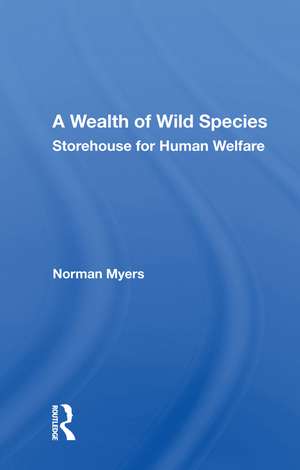A Wealth of Wild Species: Storehouse for Human Welfare
Autor Norman Myersen Limba Engleză Hardback – 28 apr 2020
Preț: 768.45 lei
Preț vechi: 1105.29 lei
-30% Nou
Puncte Express: 1153
Preț estimativ în valută:
147.09€ • 159.83$ • 123.63£
147.09€ • 159.83$ • 123.63£
Carte tipărită la comandă
Livrare economică 21 aprilie-05 mai
Preluare comenzi: 021 569.72.76
Specificații
ISBN-13: 9780367018337
ISBN-10: 0367018330
Pagini: 288
Dimensiuni: 146 x 229 mm
Greutate: 0.69 kg
Ediția:1
Editura: Taylor & Francis
Colecția Routledge
Locul publicării:Oxford, United Kingdom
ISBN-10: 0367018330
Pagini: 288
Dimensiuni: 146 x 229 mm
Greutate: 0.69 kg
Ediția:1
Editura: Taylor & Francis
Colecția Routledge
Locul publicării:Oxford, United Kingdom
Cuprins
Preface -- Prologue -- Wild Species: A Key Factor in Our Daily Lives -- Agriculture -- A Tale of a Few Wild Corn Stalks -- The Genetic Guts of Modern Agriculture -- More Genes for Mealtimes -- New Foods Coming on Line -- Insect Food of the Future -- Medicine -- Plants and Medicine -- Plants as Sources of Anticancer Drugs -- Animals and Medicine -- Marine Life and Medicine -- Industry -- Plants and Industry -- Growing Gasoline -- Some Esoteric Uses of Wildlife -- Genetic Engineering -- The Ultimate Genetic Contribution -- Epilogue -- Dollars and Sense -- Other Titles of Interest from Westview Press
Descriere
As environmentalists and wildlife enthusiasts argue for preservation of wild species, they sometimes overlook a most compelling fact-the survival of wild species directly benefits humans. Like the Earth's most precious minerals, the planetary gene pool is a valuable natural resource that is vulnerable to irreversible harm. Yet, if present trends toward extinction persist, possibly one-third and conceivably one-half the entire spectrum of species may be lost to us within another century. What does this mean? In 1960, a child suffering from leukemia had only one chance in five of remission. Today, thanks to a drug developed from an obscure tropical forest plant, the rosy periwinkle, the odds are reversed and that child has an 80 percent chance. In fact, each time we take a doctor's prescription to a pharmacy, there is a one-in-two chance that the medication we collect originated in the unique properties of a wild plant or animal. Wild species of plants also hold the promise of revolutionizing agriculture around the world, and their uses as foods, sources of new chemicals for pest control, and even new kinds of contraceptives are being developed. Wild animals likewise have made great-and often little known-contributions to mankind. Studies of a woodpecker's vertebrae have led to better design for antiwhiplash equipment in automobiles, and engineering information derived from studies of hummingbirds is contributing to improved helicopters.
